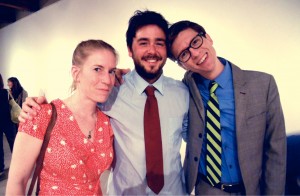MFA Thesis Reading: Mickey Kenny, Derek Askey, and Joanna Doxey
by Brittany Goss, editorial assistant
On March 29, 2013, the Hatton Gallery at the CSU Visual Arts Center was packed with the friends, teachers, students, and proud family members of third-year MFA students Mickey Kenny, Derek Askey, and Joanna Doxey. Everyone came to hear the three writers’ final readings, a celebration of completing the MFA program and graduating with their master’s degrees. This event was especially important to the Center for Literary Publishing because Joanna and Derek serve as associate editors of Colorado Review.
Mickey Kenny set the tone, reading from his thesis “Harm Harness Harmony,” a book of poems in four parts. It became clear from the beginning that each writer was interested in thematic questions of place, as Mickey explained his subtitles referred to the four elements: water, air, earth, and fire. He read from the section “Watertecture Hexagonoir” (water via eye). This melding of nature and body creates a kind of internal worldscape, so that self and place overlap and bleed into one another. “I fear the rivers within us,” he read, then, “…a part of me has drifted, is drifting, and I don’t know where to ashore myself.” In “Watertecture,” Mickey took us on a journey through the bodyscape and Alaskan landscape, to the Iditarod, of which he read:
My feet are sore and there are roots within my mouth. Iditarod. The word tastes exile. Hidedhod. I taste exile. Distant, Distant place, river. I fear the Hidedhod within me. I stow emotion within movement. I can no longer offer structure. I crave space untethered.
Indeed, space untethered is what Mickey gave us in the reading from his manuscript; a spacious, wandering poetry.
Derek Askey, who has interned at the Center for Literary Publishing since 2011, represented MFA fictioneers with a reading from his novel in progress, tentatively titled “Under the Allegheny.” The story, set in Derek’s hometown of Pittsburgh, follows the beer brewing Weiss family as they navigate the social and economic pressures of late 19th-century America. The selection he read began with details of place, with sounds of the city, and, as he noted beforehand, corresponding bodily functions: “A hiccup, a burp. The clatter of West Penn Railway tracks not one block south. The peal of firecrackers lit in the distance. These sounds burned across the July humidity.”
On Independence Day, fourteen-year-old Gregor Weiss can be found drinking in his father’s taproom. Between the threat of violence from older, stronger men and the threat of disruption from some temperance women who crash the bar, Gregor has a flash of adolescent insight about the future he might have. He is aware “that a vast, broken world awaited him … it would overtake him, this world, Gregor was certain. It would break him to its will. And it would be his father who did the breaking.” That he has not yet glimpsed this vast world ahead of him is clear, as he is trapped inside his undeveloped body, inside his father’s brewery, and inside the boundaries of his industrial city. The end of the chapter takes us to the edge of the Allegheny River, which, in a moment of fear, Gregor hopes might sweep him away from his place, for, as he and Derek noted, “Men shaped their own destinies, or they were not men.” The audience received, from Derek’s reading, the promise of a spacious novel in which Gregor and his family might shape something like a destiny.
Finally, the audience was treated to the poetry of Joanna Doxey, who has interned for the Center since 2010. The work she read from her thesis, was, again, a poetry concerned with place, but this time with an emphasis on absence and memory. She began from the prologue, which started “this land is a memory of wind without wind”, and continued:
There is a memory of breath,
or a relearning of pronouns.
I think again of lungs or glaciers without words.
Lungs and glaciers, breath and words, intertwined and lead into her book of absence, which asks urgently about disappearance, about abandonment. She read:
Consider a meadow, with an impossibly placed boulder resting in its center, abandoned thousands of years earlier by snow and ice snow and the movement of melt—
Glaciers in their absence shape a land that holds their memory.
Some readers shy away from too much silence in performance, but the space Joanna gives us within and between her poems allowed her audience to travel the distance between time and place, body and breath. We ended the reading with a sense of release, and with a better understanding of endings, in their necessary wordlessness.
After three years of diligent work in the MFA program, including time volunteered to internships, jobs, and community literacy projects, our readers gave us an offering of keen and beautiful words to remember them by. It was a lovely final reading to celebrate their thesis year, but certainly not the last we’ll hear from these writers.
